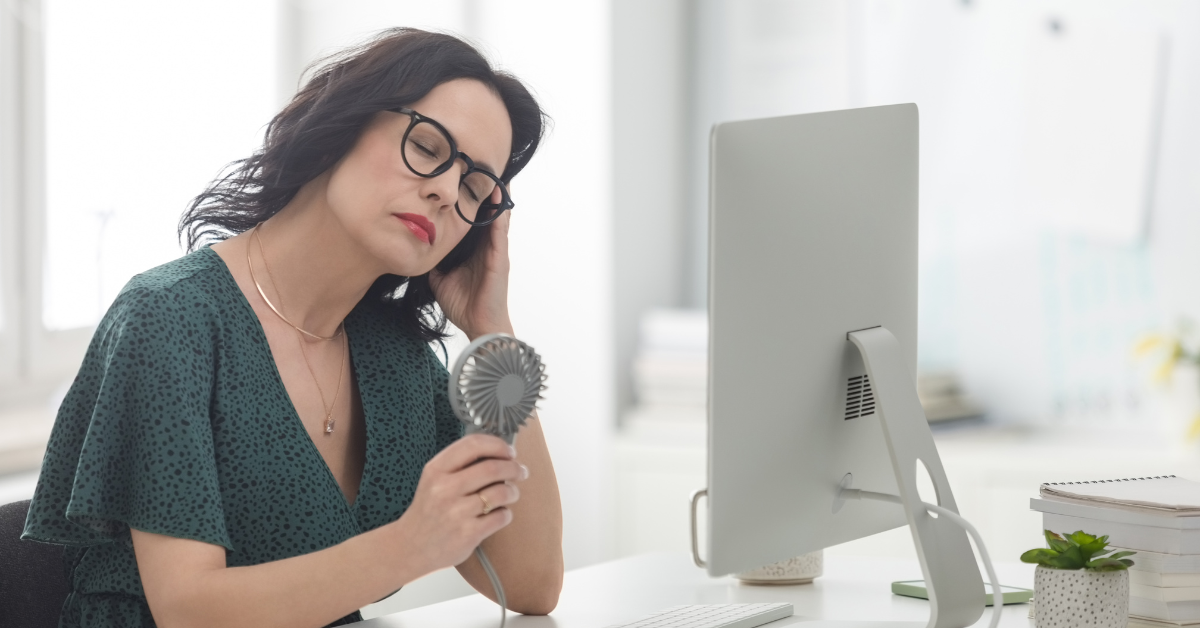October marks Menopause Awareness Month, highlighting a crucial conversation that's finally gaining the attention it deserves.
With over 70% of women aged 16-64 in employment, making up 47% of the UK workforce, understanding and supporting women through menopause isn't just compassionate - it's essential for business success.
Despite progress in workplace equality, menopause remains a largely misunderstood experience that can significantly impact women's careers and wellbeing.
As employers, you have the power to change this narrative. By creating supportive environments and offering practical solutions, you can help women navigate this natural life stage whilst maintaining productive, engaged teams.
Understanding Menopause
Menopause is a significant life transition that affects every woman differently. To provide meaningful support, it's important to understand what women experience during this time.
1) Perimenopause
This transitional phase typically begins around age 47 but can start as early as the late 30s. During perimenopause, estrogen levels gradually decline as ovarian follicles decrease, leading to irregular periods and fluctuating hormone levels. This phase usually lasts about four years.
2) Menopause
Medically defined as going one full year without a period, menopause typically occurs around age 51. However, it can happen in the mid-40s for some women.
3) Postmenopause
After menopause, women are considered postmenopausal. Given that women live into their 80s on average, they spend approximately a third of their lives in this phase.
Common Menopause Symptoms
Because estrogen receptors are present throughout the body, declining hormone levels can affect virtually every organ system. Women may experience:
Physical symptoms:
• Hot flushes and night sweats
• Joint aches and muscle pain
• Fatigue and sleep disturbances
• Bloating and digestive issues
Cognitive and emotional symptoms:
• Brain fog and difficulty concentrating
• Memory problems
• Mood swings and irritability
• Anxiety and depression
Long-term health concerns:
• 1 in 2 women will develop osteoporosis as a consequence of menopause
• Women are twice as likely to develop dementia or Alzheimer's than men
The Workplace Challenge
The impact of menopause in the workplace cannot be understated. Research shows that 59% of women have taken time off work due to menopause symptoms, whilst 36% experience symptoms of depression during this transition.
For working mothers and women balancing family responsibilities, these challenges are often compounded. The combination of caring for aging parents, supporting teenage children, and managing their own health transitions creates a perfect storm of stress and responsibility.
When women feel unsupported during menopause, businesses lose valuable talent and institutional knowledge. The cost of replacing experienced employees far exceeds the investment required to provide adequate support during this life stage.
Practical Tips for Employers
Creating a menopause-friendly workplace requires both policy changes and cultural shifts. Here are actionable steps you can implement:
1) Develop clear policies
• Establish flexible working arrangements that accommodate medical appointments
• Review sick leave policies to ensure they cover menopause-related absences
• Create clear guidelines for managers on how to support employees experiencing menopause
2) Foster open communication
• Train managers to have sensitive conversations about health and wellbeing
• Normalise discussions about menopause in the workplace
• Provide educational resources for all employees, not just women
3) Environmental considerations
• Ensure workplace temperature can be adjusted easily
• Provide access to quiet spaces for employees who need breaks
• Consider desk fans or cooling products for individual use
4) Promote wellness initiatives
• Offer stress management programmes and mental health support
• Provide access to fitness facilities and wellness programmes
• Consider partnerships with healthcare providers for specialist menopause support
The Power of Exercise for Women's Health
As women age, maintaining an active lifestyle becomes increasingly important. Physical activity is one of the most effective ways to support women through menopause and beyond with both immediate and long-lasting benefits including:
1) Disease prevention
• Exercise can reduce the risk of breast cancer by around 20%
• Regular physical activity decreases dementia risk by approximately 30%
• Weight-bearing exercises help prevent osteoporosis and maintain bone density
2) Symptom management
• Physical activity helps regulate body temperature, reducing hot flushes
• Exercise releases endorphins, which combat the increased cortisol levels common during menopause
• Regular movement improves sleep quality by up to 65%
3) Mental health benefits
• Women with low levels of physical fitness are 60% more likely to suffer from anxiety
• Exercise reduces symptoms of depression, which affects 36% of women during menopause
• Physical activity increases energy levels and improves stress management
At Epassi, we understand that supporting women's health requires a comprehensive approach. Our employee benefit schemes provide practical solutions that address both physical and mental wellbeing needs.
Through our discounted gym memberships, employees can access over 4,000 fitness locations nationwide. Regular exercise is particularly beneficial for women experiencing menopause, offering relief from symptoms whilst building long-term health resilience.
While our discounted health assessments provide early detection and monitoring services. With access to over 100 different assessments through 1,600+ clinics, women can proactively manage their health during this transitional period. These services include hormone testing, bone density scans, cardiovascular assessments, and mental health support - all crucial components of menopause management.
Creating Lasting Change
Supporting women through menopause isn't just about implementing policies, it's about creating a culture where women feel valued and supported throughout their careers. This requires commitment from leadership, education for all employees, and ongoing dialogue about women's health needs.
Remember that menopause affects not just the individual but also their colleagues, partners, and families. When workplaces become more understanding and supportive, everyone benefits from improved team dynamics and reduced stress.
Ready to transform your workplace? Contact us to learn about Epassi's benefit schemes and discover how our comprehensive wellness programmes can help your team thrive through every life stage. Your employees and your business will thank you for it.


